– Dr Sam Staddon
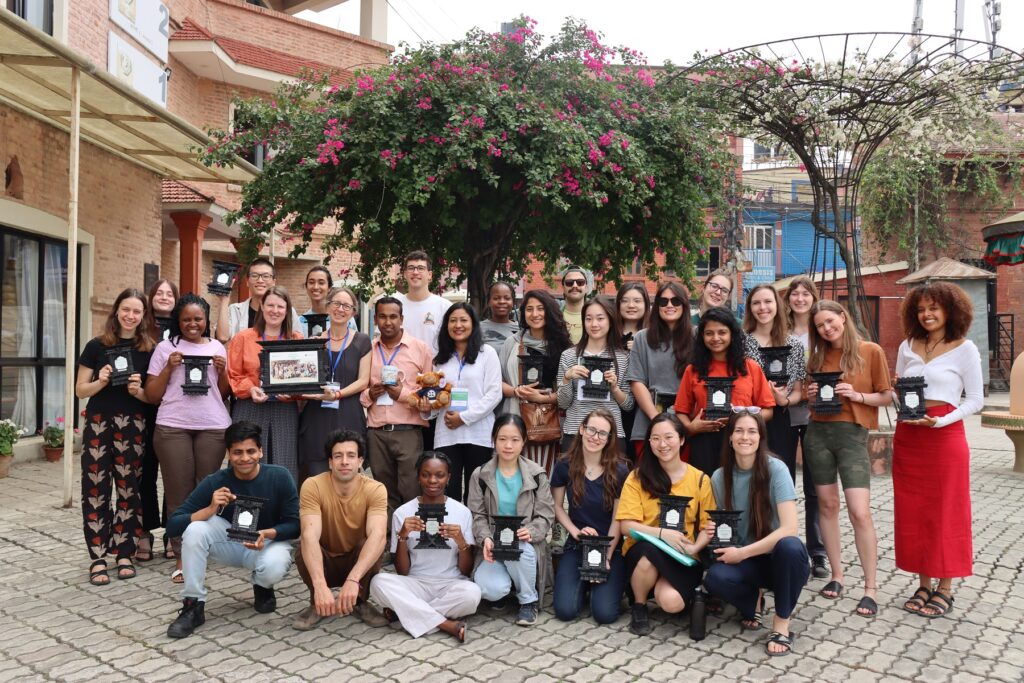
Engaging with much needed debate on the roles and responsibilities of ‘fieldwork’ in university education and research more broadly, Guasco (2022)[1] proposes ‘an ethic of not going there’ and argues that ‘doing geographical fieldwork should have to be justified to the same extent as not doing fieldwork is expected to be justified’ (p.1). Having introduced our students to Guasco’s work and ideas before we left Edinburgh for a two week trip to Nepal, her words kept ringing in my ears, and now having now finished the trip and returned to the UK, I’d like to reflect a little on them, to consider the justification and practice of such fieldwork.
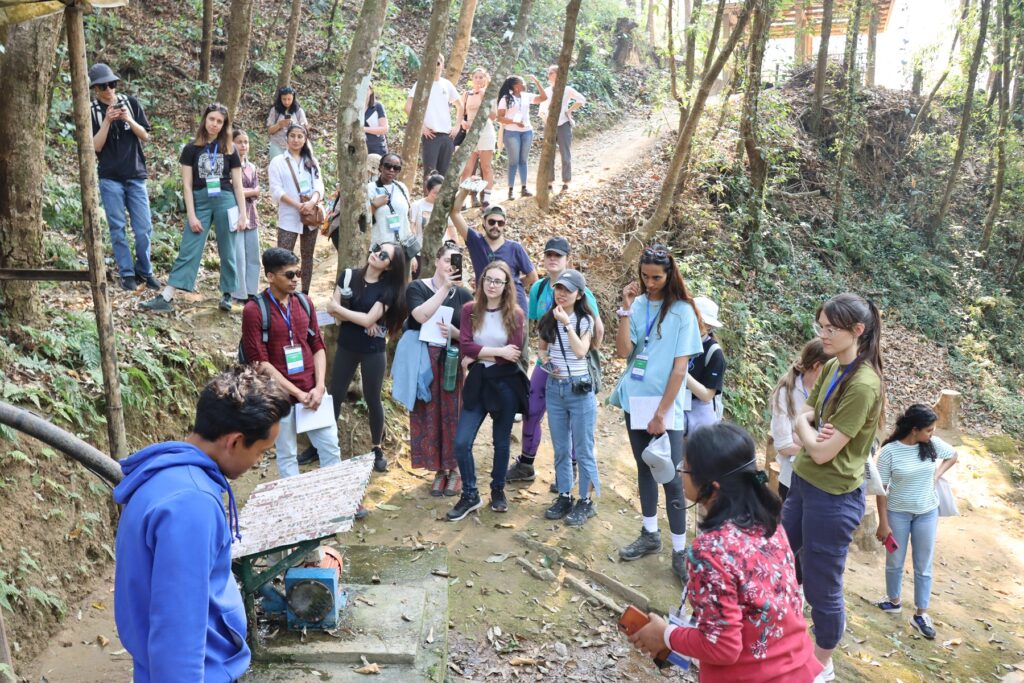
Our trip to Nepal (and associated assessments) forms a core component of the Masters in Environment and Development at the University of Edinburgh, UK. This year saw the resumption of the trip after two years pause due to the pandemic, and involved 25 University of Edinburgh students and 4 staff (including two PhD students). There was absolutely no doubt that we would again wish to partner with and be hosted by SIAS, who did such an amazing job of supporting the trip when it first ran in 2019, and of shifting it to an ‘Online Experience’ when it coincided with the start of the pandemic and lockdowns in 2020. As University of Edinburgh staff who have worked on the trip, we have explored and written about its pedagogical value and some of its emotional and ethical dimensions[2], as well as reflected on it year by year[3]. As the trip continues to develop, and as demands and debates around fieldwork necessarily shift, it is worth reflecting and writing again here, on this year’s trip.
Critiques of fieldwork in relation to higher education, research and the broader project of ‘development’, stem from feminist, postcolonial and decolonial scholars and activists, amongst others. Critiques centre the problematic and exploitative nature of the stereotypical ‘colonial-masculinist explorer’ and the ways in which fieldwork can be exclusionary or pose risks for some based on race, ethnicity, gender and sexuality, or for those with caring responsibilities and disabilities. There is a clear need to be attentive to power relations in fieldwork, to reflect on relational and situated intersectional positionalities and subjectivities, and to consider the ethics of engagement. These are things we take seriously in our own research[4] and in relation to our teaching; as such, they are discussed in class throughout the Masters and are an integral part of students’ assessment in relation to the trip to Nepal.
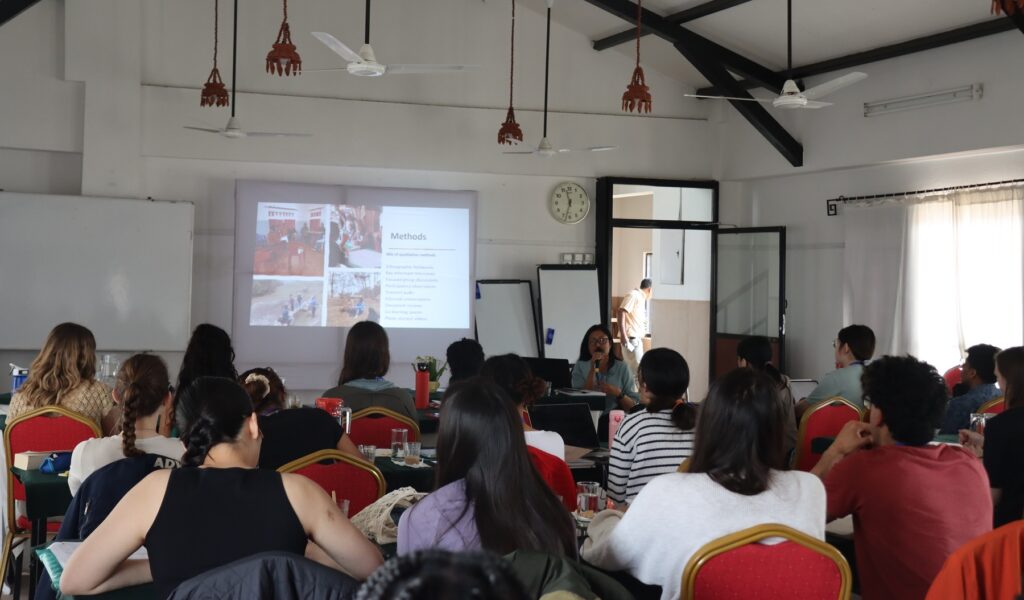
Guasco (2022) provides a great overview of these ethical and practical concerns, and discussing where and how fieldwork might be practiced focuses in on issues of access, given the presumed settler-colonial entitlement to ‘the field’ evident in some fieldwork. She offers a useful contrast between ‘access is violence’ and ‘access is love’;
‘Access can be violent. But it also can be love – because both violence and love are relational. Access as love is about care, trust, respect and reciprocity; access as violence assumes entitlement and proprietary control. Access as love requires shaping relations and relationships to be care-full – in the double sense, of both being full of care and of being cautious and not assuming entitlement to people’s lands, knowledge, time or stories’ (Guasco 2022, p.4; emphasis added)
‘Access is love’ is discussed as a form of praxis, i.e. ‘bringing together theory, activism and visions of a better and more just future to guide both interpersonal and collective action’ (p.3). I wish to reflect here briefly on whether our trip to Nepal might be considered a praxis of ‘access is love’, and in turn whether this might justify (to myself, and to others) our ethic and choice to ‘go there’.
Partnering with SIAS for the trip is an active ethical choice – as well as a huge privilege and absolute pleasure. SIAS’s Mission ‘To nurture, cultivate, organize and promote critical knowledge, research and scholarly learning in South Asia’[5] fits perfectly with the goals of our MSc in Environment and Development, which ‘enables you to critically evaluate the multiple dimensions of the inter-relationship between development and the environment, with an abiding concern for social and environmental justice’[6]. Our students (and staff!) are thus able to learn deeply from SIAS staff, projects and approaches, as they all engage with and embody critical perspectives to environment and development challenges and issues of justice. In our end-of-the-day reflective sessions with students during the trip, many commented on how good it was to see things we’d discussed in an abstract or generic level in class in Edinburgh, actually exemplified or enacted ‘on the ground’ – such as how theories of ‘intersectionality’ can help explain why even dalits as a ‘marginalised’ group cannot be homogenised, or the very real challenges of attempting knowledge ‘co-production’ and the need to be honest about likely ‘impacts’ of even action research.
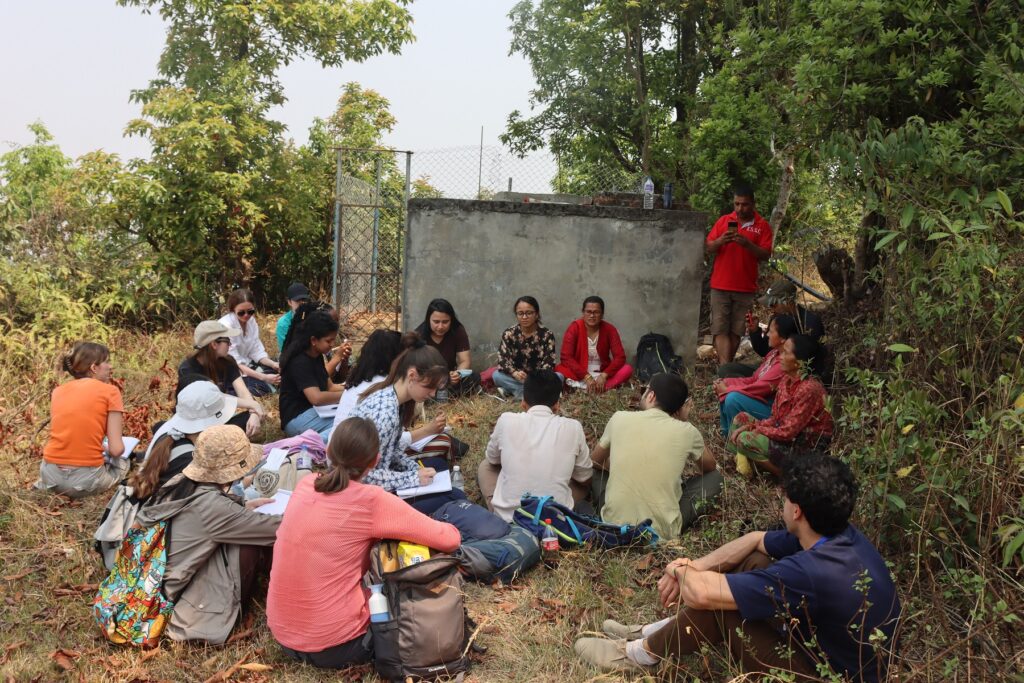
Our relationship with SIAS has evolved over the last 5 or 6 years through research connections and collaborations. We have thus been able to develop mutual care, trust, respect and reciprocity; and I would suggest we have together shaped ‘care-full relationships’, which Guasco (2022) suggests are necessary for a praxis of ‘access is love’. We see how SIAS also has such relationships with other critical practitioners and researchers in Nepal, and due to this when these people engage with us during the trip they are extremely open and honest, and we learn far more deeply about environment and development challenges in Nepal from them than would otherwise be possible. We also learn from the ways in which SIAS staff shape care-full relationships in their research projects, for example from one who shared that when working in urban areas with members of local communities they “never project ourselves as the experts – even though community members often see us as such”. In our end-of-the-day reflective sessions, students picked up on this importance of respect and care in engaging with people during the trip, sharing that “we’re here as guests – we need to ask questions in respectful ways”, and that “we need to think critically, but not ask questions that come across as critical”.
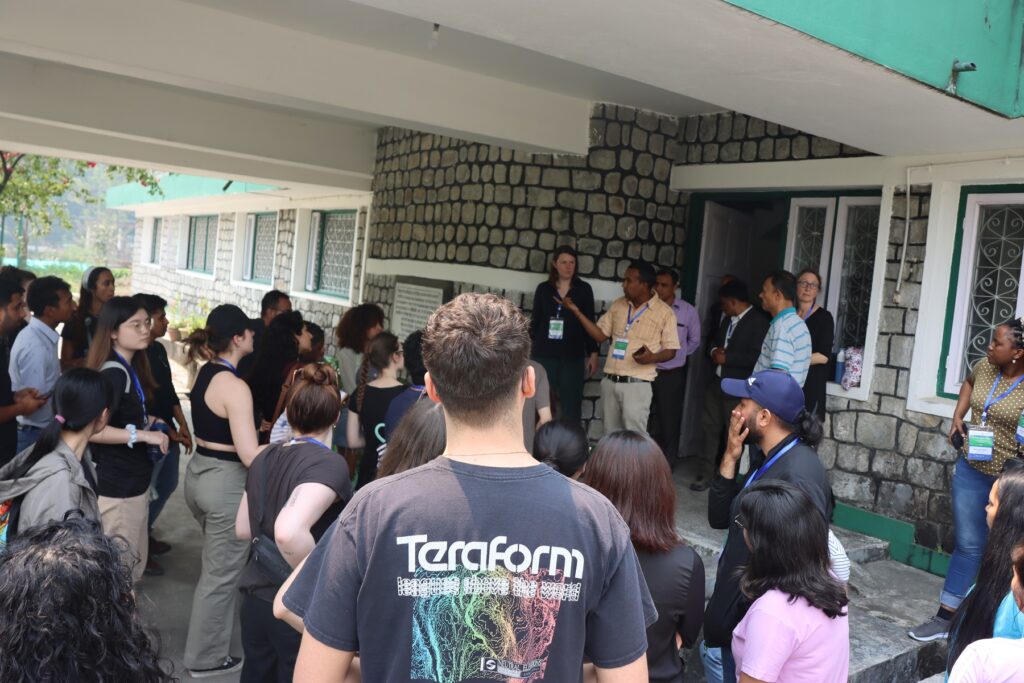
We were also able to learn from the ways in which SIAS explicitly and implicitly centres emotions and care in their work. SIAS staff have written on the importance of engaging openly with emotions in their research[7], and during our trip embodied an ethic of care, as they not only included staff member’s children when childcare needs demanded it, but actively sought to involve them by sitting them at the front during presentations, and giving them roles within the trip, such as trip photographer. Their ethic of care extended to ensuring all who engaged with us during the trip were invited to our Farewell Dinner on the last night, and this allowed relationships to deepen and develop further, based on having danced and sang together, and getting to know each other better on a ‘personal’ level.
So, should we have ‘gone there’, to Nepal, for our Masters trip? Can we justify this ‘fieldwork’? Guasco (2022) raises concerns that doing fieldwork means people feel entitled to ‘speak on a place just because you have “been” there’ (p.4). However I see it a little differently. Whilst of course we may all wish to come to know about and understand people or places, for a Masters trip such as this, the value of fieldwork is more about learning to experience and be able to articulate our own positions and politics, which we can more fully understand from being immersed in particular places in particular ways. As such, whilst I hope that our students have learnt about Nepal’s environment and development challenges and injustices, I hope more so that they have learnt about themselves, and the ways in which they might in future careers go about engaging with those challenges and injustices in places around the world. As others who take students to Nepal have said, “We do not go to Nepal to change Nepal, we go there to let Nepal change us”[8]. This year’s cohort of 25 students represents 15 nationalities and countless intersectional positionalities, pasts and perspectives. Everyone has learnt different things about themselves during the trip and will have been changed in differing ways by Nepal.
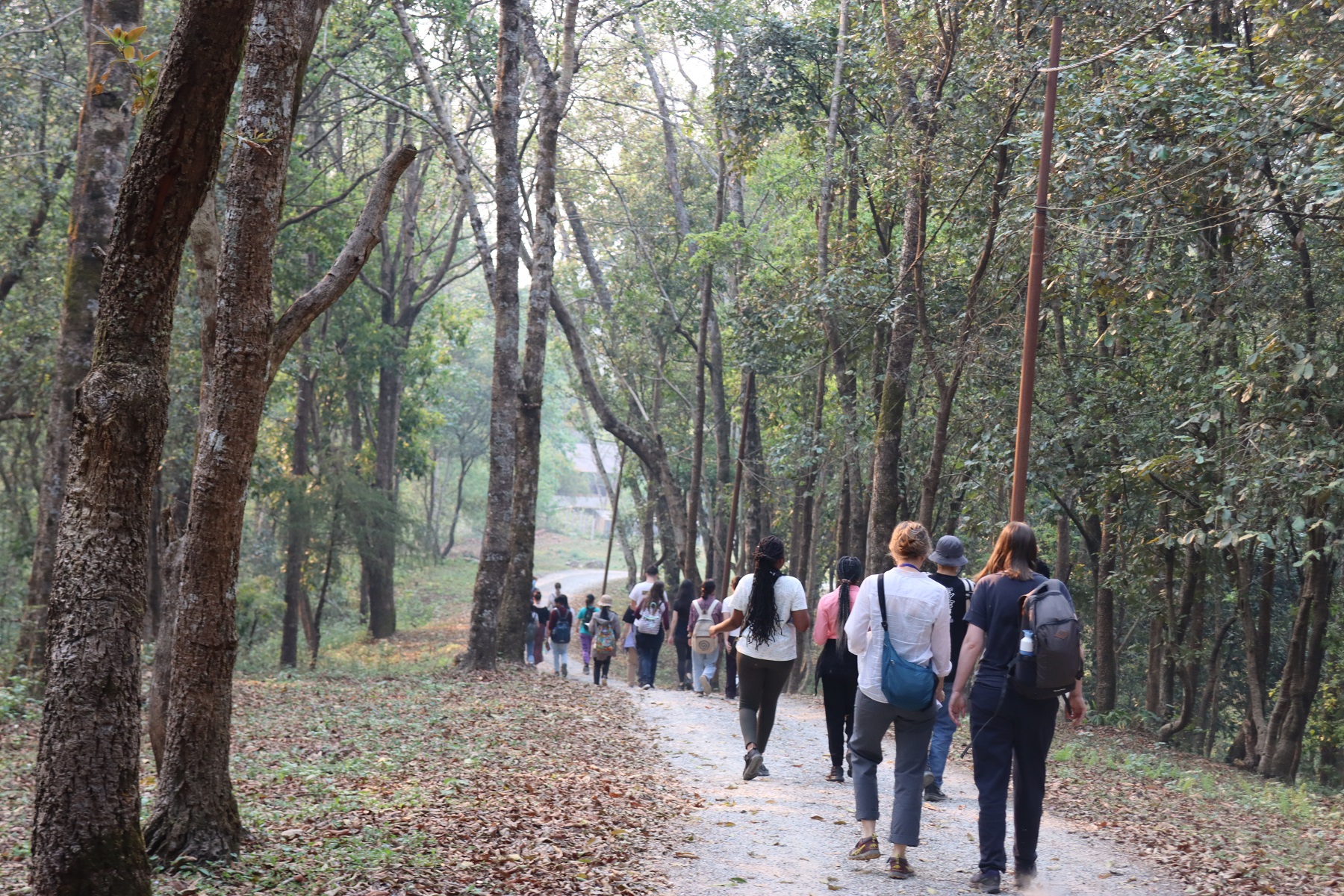
As in past trips, one assessment is an individual reflective essay, in which students discuss “What studying environment and development “in the field” means to me: Reflections from a group trip to Nepal”. I cannot wait to read these essays and to see how students articulate their time in Nepal and their learning from it. I am hoping (hopeful) that the essays will reveal glimpses of learning fieldwork praxis as ‘access is love’ – rather than ‘access is violence’. Either way, as staff we will learn from these student reflections and will be able to work with SIAS to adjust next year’s trip as we see necessary in order to push ever further towards ‘access is love’. Being able to justify fieldwork as ‘access is love’ is necessarily an unfinished task, and needs to be revisited over time, and I look forward to many more years working with SIAS on this important pedagogical and political project.
The authors is Senior Lecturer in Environment and Development, University of Edinburgh, UK
[1] Guasco (2022) On an ethic of not going there. The Geographical Journal. https://doi.org/10.1111/geoj.12462
[2] Staddon, Barnes, Lai, Scazza & Wilkie (2021) A ‘Token Of Love’: The Role of Emotions in Student Field Trips Teaching Critical Development Geographies. Journal of Geography in Higher Education. https://doi.org/10.1080/03098265.2021.1977918
[3] Staddon (2019) Transformative learning through fieldwork and collaborations and Staddon (2020) Students fieldtrip in a time of COVID-19 – Reflections on a remote ‘Nepal Experience’ and an Ethics of Care
[4] Staddon (2022) Critically Understanding Livelihoods in the Global South: Researchers, research practices and power. In (Eds.) Nunan, Barnes & Krishnamurthy. The Routledge Handbook on Livelihoods in the Global South, Routledge. pp.81-92; Staddon(2014) The Ethics of ‘Giving Back’ to Communities involved in fieldwork. In (Ed.) Lunn. Ethical challenges and dilemmas of fieldwork in the Global South, Routledge. pp.249-261.
[5] See https://sias-southasia.org/sias/
[6] See https://www.ed.ac.uk/studying/postgraduate/degrees/index.php?r=site/view&edition=2020&id=30
[7] Giri, Maskey & Khatri (2023) Emotional Reflections in The Practice of Qualitative Research
[8] See https://www.nepalitimes.com/here-now/one-person-s-adversity-brings-hope-to-many

